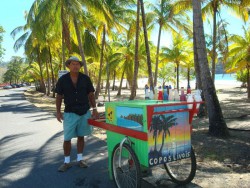- Home » Expat Articles » Interviews » American Expat Living in Costa Rica - Interview with Kathy
American Expat Living in Costa Rica - Interview with Kathy
| Published: | 14 Oct at 9 AM |
Want to get involved?
Become a Featured Expat and take our interview.
Become a Local Expert and contribute articles.
Get in touch today!
Become a Local Expert and contribute articles.
Get in touch today!
Filed: Interviews,Costa Rica
At age 50 Kathy joined the U.S. Peace Corps Volunteer serving in Burkina Faso, West Africa. After returning to the U.S., she and her husband sold everything to move to Costa Rica and retire early (they're both mid-50s). So they packed the cookware, a 17-pound Lakeland terrier, and their 17-year-old cat. Enjoy their expat, often-funny life "living it up" on $2000 a month, trying to prepare gourmet meals without a U.S. grocer, and making crafts with items found or re-purposed., Come, laugh along with Kathy, her sarcastic wit and misadventures. Kathy's expat blog is called Lo Que Hay: It's a whole 'nuther country (see listing here)
Where are you originally from?
Kathy and Rusty are both originally from Irving, Texas in the DFW area.
In which country and city are you living now?
Kathy and her husband (and their two pets) now live in the hills just outside of Samara, Costa Rica, 15 minutes from the beaches of the Pacific Ocean.
How long have you lived in Costa Rica and how long are you planning to stay?
Kathy and her husband sold everything to move to Costa Rica. They purchased their home in October of 2014 and are permanent residents of Costa Rica.
Why did you move to Costa Rica and what do you do?
Having been temporary expats previously (in West Africa and in Europe), Kathy and her husband finally "pulled the plug" on life in the U.S. (too many politicians, prescription commercials, and Kardashians) and moved abroad for a slower and sometimes off-the-grid lifestyle. They sold nine motorcycles, two homes, four cars, and every stick of furniture to purchase a mostly-finished, fully-furnished new home in Costa Rica.
Did you bring family with you?
Kathy's husband, Rusty, is also now a full-time expat in Samara, though he continues to work via Internet at his job in Texas. After all, someone has to keep that terrier in dog biscuits.
How did you find the transition to living in a foreign country?
Having lived in Burkina Faso (the third poorest country in the world) for two years, culture shock wasn't an issue for Kathy. She is game for most anything. Both Rusty and Kathy have travelled extensively and understand the importance of becoming culturally competent and making friends with the locals, not merely isolating their lives solely within the expat community. And it is Kathy's interaction with the locals, called "Ticos" that makes life such an adventure . . . or misadventure, depending on your point of view.
Was it easy making friends and meeting people; do you mainly socialise with other expats?
True, Kathy and Rusty socialize primarily with other expats due to the language (Tico-Spanish) issue. However, they have many Tico friends and entertain both Ticos and expats regularly. Making friends is never difficult for Kathy, who never met a stranger.
What are the best things to do in the area; anything to recommend to future expats?
Costa Rica contains such bio-diversity that one can zip-line through rain forests in the morning, sit in volcanic mud before lunch, and river raft in the afternoon. Alternatively, grab a good book and lounge under a palm-lined beach, or enjoy world-class surfing 15 minutes from home.
What do you enjoy most about living in Costa Rica?
Kathy and Rusty have Internet, but the speed is often questionable. They presently have no television service, with no plans to establish satellite TV. So what do they do for entertainment? There's monkey watching with several troupes of howler monkeys living just a few meters away from their terrace. The snorkeling and SCUBA diving is exceptional during a portion of the year. The best thing about living in Samara is the wonderful local population . . . always ready to help with language skills, assist with safety/security tips, and help with any necessary service (from world-class medical care to custom-ordered grocery requests).
How does the cost of living in Costa Rica compare to home?
Kathy and Rusty might have been working into their early 70s, unable to fully retire, due to the high cost of living in the U.S. Due to very low property taxes, auto insurance, health insurance, and utilities, the cost of living in Costa Rica is just barely over one-half of what it was/is in the United States.
What negatives, if any, are there to living in Costa Rica?
If you need constant access to the Internet, if you've left your sense of humor "back home," and if you don't have the ability to laugh at yourself, Costa Rica is not for you. The exchange of U.S. amenities for a slower pace of life and living with an ocean AND jungle view means that there are periodic, short electrical outages and interruption of Internet service. Living on a mountain, during rainy season the roads are very, very rough (a 4x4 vehicle is a must).
If you could pick one piece of advice to anyone moving to Costa Rica, what would it be?
Life in Costa Rica is still just life. If you're not happy where you are, and if you are looking to escape to paradise somewhere/anywhere else in the world, you'll be disappointed. But if you're a generally well-adjusted individual with even a basic sense of humor, Costa Rica may be for you.
What has been the hardest aspect to your expat experience so far?
Since Kathy's husband works at his Texas job using the Internet, periodic interruption in Internet service is indeed a challenge. On such occasions, Rusty must drive down the mountain (15 minutes) to a beach bar/restaurant with always-reliable WiFi where he is able to work, eat fresh fish tacos, drink beer, and watch girls in bikinis play volleyball. Poor Rusty!
When you finally return home, how do you think you'll cope with repatriation?
Kathy and Rusty have no intention of returning home. Repatriation after two years in West Africa was very difficult. They are not returning to the U.S.
What are your top 5 expat tips for anyone following in your footsteps?
Kathy's blog is the story (soup to nuts) of purchasing a home for $135,000 USD, selling everything, and moving to Costa Rica. Her sarcastic wit is sometimes shocking, but always entertaining. This gal can tell a story and omits nothing when it comes to her own mistakes and misadventures. This blog might be considered a how-to guide when purchasing a home in Costa Rica.
How can you be contacted for further advice to future expats coming to your area?
My best method of contact is email: [email protected]
Here's the interview with Kathy...
Where are you originally from?
Kathy and Rusty are both originally from Irving, Texas in the DFW area.
In which country and city are you living now?
Kathy and her husband (and their two pets) now live in the hills just outside of Samara, Costa Rica, 15 minutes from the beaches of the Pacific Ocean.
How long have you lived in Costa Rica and how long are you planning to stay?
Kathy and her husband sold everything to move to Costa Rica. They purchased their home in October of 2014 and are permanent residents of Costa Rica.
Why did you move to Costa Rica and what do you do?
Having been temporary expats previously (in West Africa and in Europe), Kathy and her husband finally "pulled the plug" on life in the U.S. (too many politicians, prescription commercials, and Kardashians) and moved abroad for a slower and sometimes off-the-grid lifestyle. They sold nine motorcycles, two homes, four cars, and every stick of furniture to purchase a mostly-finished, fully-furnished new home in Costa Rica.
Did you bring family with you?
Kathy's husband, Rusty, is also now a full-time expat in Samara, though he continues to work via Internet at his job in Texas. After all, someone has to keep that terrier in dog biscuits.
How did you find the transition to living in a foreign country?
Having lived in Burkina Faso (the third poorest country in the world) for two years, culture shock wasn't an issue for Kathy. She is game for most anything. Both Rusty and Kathy have travelled extensively and understand the importance of becoming culturally competent and making friends with the locals, not merely isolating their lives solely within the expat community. And it is Kathy's interaction with the locals, called "Ticos" that makes life such an adventure . . . or misadventure, depending on your point of view.
Was it easy making friends and meeting people; do you mainly socialise with other expats?
True, Kathy and Rusty socialize primarily with other expats due to the language (Tico-Spanish) issue. However, they have many Tico friends and entertain both Ticos and expats regularly. Making friends is never difficult for Kathy, who never met a stranger.
What are the best things to do in the area; anything to recommend to future expats?
Costa Rica contains such bio-diversity that one can zip-line through rain forests in the morning, sit in volcanic mud before lunch, and river raft in the afternoon. Alternatively, grab a good book and lounge under a palm-lined beach, or enjoy world-class surfing 15 minutes from home.
What do you enjoy most about living in Costa Rica?
Kathy and Rusty have Internet, but the speed is often questionable. They presently have no television service, with no plans to establish satellite TV. So what do they do for entertainment? There's monkey watching with several troupes of howler monkeys living just a few meters away from their terrace. The snorkeling and SCUBA diving is exceptional during a portion of the year. The best thing about living in Samara is the wonderful local population . . . always ready to help with language skills, assist with safety/security tips, and help with any necessary service (from world-class medical care to custom-ordered grocery requests).
How does the cost of living in Costa Rica compare to home?
Kathy and Rusty might have been working into their early 70s, unable to fully retire, due to the high cost of living in the U.S. Due to very low property taxes, auto insurance, health insurance, and utilities, the cost of living in Costa Rica is just barely over one-half of what it was/is in the United States.
What negatives, if any, are there to living in Costa Rica?
If you need constant access to the Internet, if you've left your sense of humor "back home," and if you don't have the ability to laugh at yourself, Costa Rica is not for you. The exchange of U.S. amenities for a slower pace of life and living with an ocean AND jungle view means that there are periodic, short electrical outages and interruption of Internet service. Living on a mountain, during rainy season the roads are very, very rough (a 4x4 vehicle is a must).
If you could pick one piece of advice to anyone moving to Costa Rica, what would it be?
Life in Costa Rica is still just life. If you're not happy where you are, and if you are looking to escape to paradise somewhere/anywhere else in the world, you'll be disappointed. But if you're a generally well-adjusted individual with even a basic sense of humor, Costa Rica may be for you.
What has been the hardest aspect to your expat experience so far?
Since Kathy's husband works at his Texas job using the Internet, periodic interruption in Internet service is indeed a challenge. On such occasions, Rusty must drive down the mountain (15 minutes) to a beach bar/restaurant with always-reliable WiFi where he is able to work, eat fresh fish tacos, drink beer, and watch girls in bikinis play volleyball. Poor Rusty!
When you finally return home, how do you think you'll cope with repatriation?
Kathy and Rusty have no intention of returning home. Repatriation after two years in West Africa was very difficult. They are not returning to the U.S.
What are your top 5 expat tips for anyone following in your footsteps?
- Whether you're buying (as Kathy and Rusty did) or renting, an excellent realtor is a must. Pick someone "on the ground" in Costa Rica, and not some cyberspace agent (of which there are many). Check references on your realtor. If you're not getting that warm-fuzzy feeling, go with your instinct and immediately change agents.
- The most important thing to pack for Costa Rica is your patience. The second most important thing is your sense of humor.
- If you're bringing anything with you (and there are things that you should bring), there is no need to ship a "container" of goods. Use shrink-wrapped pallets and use ShippingCR to move your goods. Kathy and Rusty brought nothing from their lives in the U.S. EXCEPT every kitchen item they owned. ShippingCR has the best rates on the planet, it's effortless, and it's door-to-door. Forget the nightmare stories you've heard about Customs. ShippingCR is one-stop shopping.
- Kathy and Rusty viewed no less than 30 homes before making a decision. You may believe that you know precisely which town, which area, which neighborhood you want. Without seeing a minimum of 20 properties, you'll never be 100% certain that you've made the perfect choice for your new expat life.
- If you're really going to become an expat, don't try to cling to every item available in your home country. Embrace the local foods and culture; you won't regret it. For example, don't expect pickles to be exactly the same as what you left behind. Same with something as simple as mustard. If you must have a certain food or personal item in order to be happy, either make plans to ship continually, or stay home.
Kathy's blog is the story (soup to nuts) of purchasing a home for $135,000 USD, selling everything, and moving to Costa Rica. Her sarcastic wit is sometimes shocking, but always entertaining. This gal can tell a story and omits nothing when it comes to her own mistakes and misadventures. This blog might be considered a how-to guide when purchasing a home in Costa Rica.
How can you be contacted for further advice to future expats coming to your area?
My best method of contact is email: [email protected]
Grab a featured expat badge that links to this interview!
 Copy and paste code to display the Featured Expat Badge:
Copy and paste code to display the Featured Expat Badge:Comments » No published comments just yet for this article...
Feel free to have your say on this item. Go on... be the first!





 Kathy is an American expat living in Costa Rica. Blog description: We sold everything and moved a terrier and a 17-year old cat to Samara, Costa Rica to live the luxury lifestyle on $2000 per month . . . because we're poor but adventurous. Enjoy our mishaps and adventures. Come laugh at us and with us.
Kathy is an American expat living in Costa Rica. Blog description: We sold everything and moved a terrier and a 17-year old cat to Samara, Costa Rica to live the luxury lifestyle on $2000 per month . . . because we're poor but adventurous. Enjoy our mishaps and adventures. Come laugh at us and with us.





